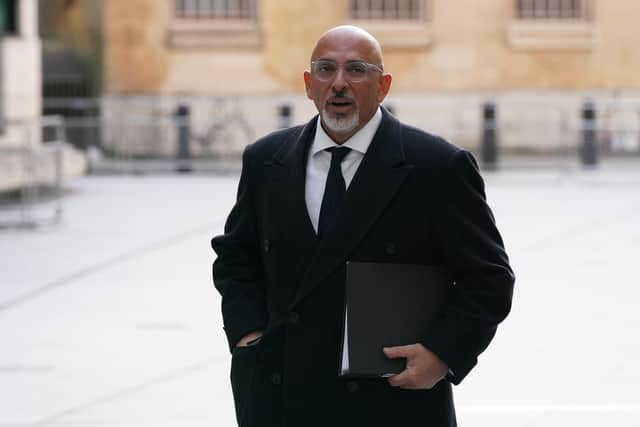'Elite' sixth forms planned in seven Yorkshire areas as part of levelling up agenda
The Government has revealed it intends to designate 55 places in England as 'Education Investment Areas'.
In the locations - which include Bradford, Doncaster, Kirklees, Leeds, North Yorkshire, Rotherham and Wakefield - the Department for Education will offer retention payments to help schools keep the best teachers in the highest priority subjects.
Advertisement
Hide AdAdvertisement
Hide AdThe areas will be prioritised as the location for new specialist sixth form free schools "where there is limited provision to ensure talented children from disadvantaged backgrounds have access to the highest standard of education this country offers".


But the effectiveness of the idea has been questioned by a headteachers' union.
Geoff Barton, general secretary of the Association of School and College Leaders, said: “We are not so sure about the idea of setting up ‘new elite sixth forms’. This sounds like they will serve children who already do very well and could put pressure on existing provision when the simplest solution would surely be to improve the lamentable state of post-16 funding.”
A consultation will also be launched on a proposal that schools in these areas that have been judged less than Good in successive Ofsted inspections being moved into the control of multi-academy trusts.
Advertisement
Hide AdAdvertisement
Hide AdEducation Secretary Nadhim Zahawi said: “The most valuable resource on the planet is the human resource. Investing in people to get on in life and receive the best possible education is core to the mission of this Government, and we are determined to help people gain the knowledge and skills needed to unleash their potential.
“This White Paper sets out our blueprint for putting skills, schools and families at the heart of levelling up. It focuses on putting great schools in every part of the country, training that sets you up for success in a high-skilled, well-paid career and ensuring no one misses out on opportunities simply because of where they live or their family background.
“Raising our expectations and aspirations for children, as well as creating a high-skilled workforce, will end the brain drain that sees too many people leaving communities in order to succeed. These plans will help create a level playing field and boost the economy, both locally and nationally.”
The Levelling Up White Paper, due to be published tomorrow, will set a new national mission to ensure that 90 per cent of children leaving primary school in England are reaching the expected standard in reading, writing, and maths by 2030. In 2019, just 65 per cent of pupils met all three standards, with the proportion substantially varying across the country.
Read more:
Advertisement
Hide AdAdvertisement
Hide AdSchools in the Education Investment Areas will also be given support to address wider issues such as a pilot programme to improve pupil attendance.
Out of the 55 areas, 12 are local authorities containing Opportunity Areas created by former education secretary Justine Greening.
Mr Barton said: “We share the Government’s ambition to improve numeracy, literacy and therefore the life chances among the one-third of young people who need more support.
Advertisement
Hide AdAdvertisement
Hide AdHe added that it was “slightly infuriating” that the Government “insists on talking about illiteracy and innumeracy”.
“These children are not illiterate or innumerate and it is somewhat insulting to describe them as such. They just fall below the expected standard at primary school against a specific set of tests,” he said.
Mr Barton said the children did need more support but that he was unsure the White Paper achieved this, as the most disadvantaged pupils needed help that went “beyond the school gates” to address poverty, while there was a “crying need” for better funding for pupils with special educational needs.
“There’s much food for thought in the outline of the government’s white paper, but the devil will, as ever, be in the detail. Identifying 55 communities for intensive additional support sounds promising and we look forward to seeing exactly how this will work,” he added.
Advertisement
Hide AdAdvertisement
Hide Ad“The idea of moving schools judged less than good in successive Ofsted inspections into multi-academy trusts sounds a little like the defunct ‘coasting schools’ policy that the Department for Education jettisoned a few years ago,” he said.
The White Paper will also include a National Youth Guarantee, with the ambition that every young person in England will have access to regular clubs and activities, adventures away from home and volunteering opportunities by 2025.
An extra £200 million is also being invested in the government’s Supporting Families programme in England.
The programme will help local areas tackle the challenges families face that can hold children back from attending and achieving at school or put them at risk of neglect or harm.
Advertisement
Hide AdAdvertisement
Hide AdMinister for Levelling up Communities and Equalities Kemi Badenoch MP said: “Our Supporting Families Programme is providing the most vulnerable families with the help they need to build a better future.
“This help means more children returning to the classroom, more parents out of work starting a job and more support for the victims of domestic abuse.”
Support The Yorkshire Post and become a subscriber today. Your subscription will help us to continue to bring quality news to the people of Yorkshire. In return, you'll see fewer ads on site, get free access to our app and receive exclusive members-only offers. Click here to subscribe.